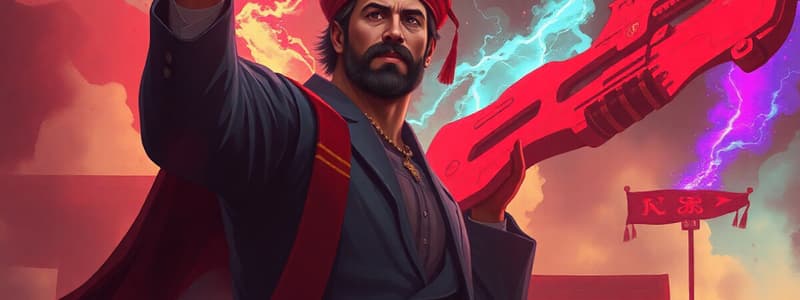Podcast
Questions and Answers
What is a primary reason for the durability of rebel regimes?
What is a primary reason for the durability of rebel regimes?
- Frequent replacements of military leadership
- Isolation from competing insurgent groups
- Delegation of power during armed struggles (correct)
- Independence from military support
What dilemma do dictators face regarding military control?
What dilemma do dictators face regarding military control?
- Sharing power always leads to stronger regimes
- Generals may take over if power is shared (correct)
- Keeping all military power leads to less stability
- They can never trust their generals
Which type of regime is more vulnerable to the guardianship dilemma?
Which type of regime is more vulnerable to the guardianship dilemma?
- Rebel Regimes
- Civilian Regimes (correct)
- Coup Regimes
- Military Regimes
According to Boix and Svolik, which factor is crucial for the stability of limited authoritarian government?
According to Boix and Svolik, which factor is crucial for the stability of limited authoritarian government?
What is a key characteristic of rebel regimes after they gain power?
What is a key characteristic of rebel regimes after they gain power?
What typically occurs with the appointment of a minister of defence in rebel regimes?
What typically occurs with the appointment of a minister of defence in rebel regimes?
Why are institutions important in dictatorships according to Boix and Svolik?
Why are institutions important in dictatorships according to Boix and Svolik?
What is a characteristic of coup regimes?
What is a characteristic of coup regimes?
What can happen when dictators accumulate too much power?
What can happen when dictators accumulate too much power?
What is one effect of establishing legislatures in a dictatorship?
What is one effect of establishing legislatures in a dictatorship?
What is the primary motivation of authoritarian rulers compared to democratic leaders?
What is the primary motivation of authoritarian rulers compared to democratic leaders?
Which of the following best describes the role of oligarchs in an autocratic regime like Putin's?
Which of the following best describes the role of oligarchs in an autocratic regime like Putin's?
What is a key aspect of the selectorate theory regarding political survival in autocracies?
What is a key aspect of the selectorate theory regarding political survival in autocracies?
What is one challenge facing authoritarian regimes in understanding their population?
What is one challenge facing authoritarian regimes in understanding their population?
How do autocratic leaders typically ensure loyalty from members of their winning coalition?
How do autocratic leaders typically ensure loyalty from members of their winning coalition?
In the selectorate framework, which group is essential for an incumbent leader to maintain power?
In the selectorate framework, which group is essential for an incumbent leader to maintain power?
What happens to dictators when the size of their winning coalition (W) increases?
What happens to dictators when the size of their winning coalition (W) increases?
What is the relationship between the size of the winning coalition (W) and public goods provision?
What is the relationship between the size of the winning coalition (W) and public goods provision?
What type of information can pose a challenge to a dictator's authority?
What type of information can pose a challenge to a dictator's authority?
In the context of autocracies, what does the Guardianship Dilemma refer to?
In the context of autocracies, what does the Guardianship Dilemma refer to?
What is a common outcome of private rents being distributed to coalition members?
What is a common outcome of private rents being distributed to coalition members?
What is the implication for welfare when the winning coalition (W) increases?
What is the implication for welfare when the winning coalition (W) increases?
What do autocratic rulers primarily use censorship and propaganda for?
What do autocratic rulers primarily use censorship and propaganda for?
What is a method that authoritarian leaders use to prevent rebellion?
What is a method that authoritarian leaders use to prevent rebellion?
Flashcards
Guardianship Dilemma
Guardianship Dilemma
The risk that a dictator, by sharing military power to secure loyalty, creates an opportunity for generals to seize control.
Rebel Regimes
Rebel Regimes
Regimes that emerge from prolonged armed struggles against an existing government.
Power Delegation in Rebel Regimes
Power Delegation in Rebel Regimes
The process of distributing power to subordinates during armed conflicts, often for improved battlefield performance and loyalty.
Testing Allegiances in Rebel Regimes
Testing Allegiances in Rebel Regimes
Signup and view all the flashcards
Power Sharing and Stability in Rebel Regimes
Power Sharing and Stability in Rebel Regimes
Signup and view all the flashcards
Minister of Defense in Rebel Regimes
Minister of Defense in Rebel Regimes
Signup and view all the flashcards
Limited Authoritarian Government
Limited Authoritarian Government
Signup and view all the flashcards
Power-Sharing Institutions
Power-Sharing Institutions
Signup and view all the flashcards
Credible Threat of Rebellion in Limited Authoritarian Governments
Credible Threat of Rebellion in Limited Authoritarian Governments
Signup and view all the flashcards
Legislatures and Resource Extraction
Legislatures and Resource Extraction
Signup and view all the flashcards
Winning Coalition (W)
Winning Coalition (W)
Signup and view all the flashcards
Selectorate (S)
Selectorate (S)
Signup and view all the flashcards
Incumbent
Incumbent
Signup and view all the flashcards
Challenger
Challenger
Signup and view all the flashcards
Members of the Winning Coalition
Members of the Winning Coalition
Signup and view all the flashcards
Members of the Selectorate
Members of the Selectorate
Signup and view all the flashcards
Private Rents
Private Rents
Signup and view all the flashcards
Incumbent's Power and Influence
Incumbent's Power and Influence
Signup and view all the flashcards
The Winning Coalition's Size
The Winning Coalition's Size
Signup and view all the flashcards
The Guardianship Dilemma
The Guardianship Dilemma
Signup and view all the flashcards
Role of Private Rents in Loyalty
Role of Private Rents in Loyalty
Signup and view all the flashcards
Impact of Small Winning Coalition
Impact of Small Winning Coalition
Signup and view all the flashcards
Impact of Large Winning Coalition
Impact of Large Winning Coalition
Signup and view all the flashcards
Winning Coalition Size and Welfare
Winning Coalition Size and Welfare
Signup and view all the flashcards
Information Control and Censorship
Information Control and Censorship
Signup and view all the flashcards
Study Notes
Autocratic Regimes: Power, Compliance, and Stability
- Autocratic leaders face challenges in maintaining power, requiring compliance from allies (oligarchs) and the broader population.
- Data collection for autocratic regimes is difficult due to limited access and potential accuracy issues, making empirical work challenging.
- Autocrats have less constraint than democratic leaders, using extensive means to achieve objectives (e.g., censorship, propaganda, coercion).
- Key issues for autocrats involve managing their close allies to prevent challenges to their authority and ensuring public compliance.
- Dictators sometimes use publicized arrests and potential legal actions to maintain control over oligarchs.
- They use various methods to control information and population behavior, striking a balance between understanding preferences and restricting their expression.
Selectorate Theory
- Selectorate theory models the pursuit and maintenance of political power in autocracies.
- Power is often concentrated in a small group (winning coalition) enabling the leader to retain power more easily.
- Dictatorships rely on a selectorate to support the leader.
- The dictator’s objective is to have a winning coalition as small as possible. A smaller coalition allows more discretion over resource allocation, i.e., allowing larger private rents to winning coalition members.
- A larger winning coalition is a higher cost and has lower taxes and less private rents.
The Winning Coalition
- The winning coalition (W) is a critical subset of the selectorate whose support is necessary for the leader to stay in power.
- The leader receives loyalty by offering private rents (gifts, benefits, concessions).
- The size of W influences tax rates and public good provision. A smaller W can lead to higher taxes and less public goods.
Regime Stability and Welfare
- Regime stability in autocracies is tied to the size of the winning coalition (W).
- Smaller W allows higher private rents to coalition members (strong loyalty), but could harm economic welfare.
- Larger W results in lower private rents, promoting a larger but less loyal coalition. This can increase economic growth and welfare.
The Guardianship Dilemma
- Strong militaries are necessary for regimes to consolidate power and suppress rebellions.
- Dictators often share power with high-ranking military officials, creating a potential for coups.
- Rebel regimes often outlast others because of power sharing in advance of regime consolidation.
- This dilemma is more pronounced in civilian regimes compared to coup or rebel regimes
Limited Authoritarianism
- Autocracies with institutional power-sharing mechanisms are often more durable and prone to peaceful transitions of power.
- The fear of allies rebelling can curb a leader’s ability to take advantage of their position.
- Effective institutions limit the leader’s power, therefore, improving regime stability.
Studying That Suits You
Use AI to generate personalized quizzes and flashcards to suit your learning preferences.




